 Petzlover
Petzlover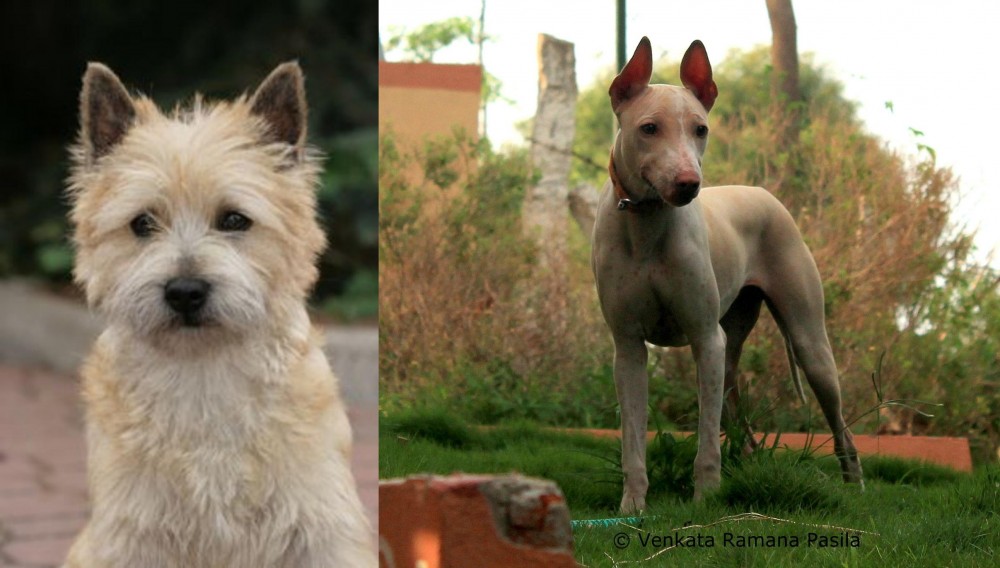 Cairn Terrier is originated from United Kingdom but Jonangi is originated from India. Cairn Terrier may grow 20 cm / 7 inches shorter than Jonangi. Cairn Terrier may weigh 13 kg / 28 pounds lesser than Jonangi. Both Cairn Terrier and Jonangi has almost same life span. Cairn Terrier may have more litter size than Jonangi. Both Cairn Terrier and Jonangi requires Low Maintenance.
Cairn Terrier is originated from United Kingdom but Jonangi is originated from India. Cairn Terrier may grow 20 cm / 7 inches shorter than Jonangi. Cairn Terrier may weigh 13 kg / 28 pounds lesser than Jonangi. Both Cairn Terrier and Jonangi has almost same life span. Cairn Terrier may have more litter size than Jonangi. Both Cairn Terrier and Jonangi requires Low Maintenance.
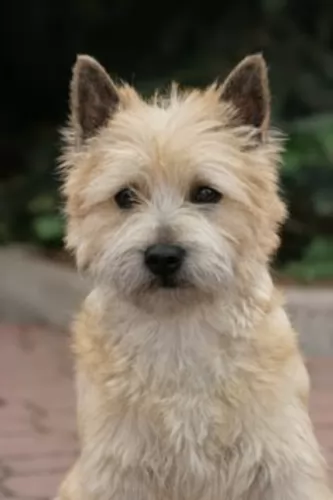 The Cairn Terrier originates in the Scottish Highlands. This feisty little dog was given the name Cairn, as he used to hunt prey between the Scottish cairns. At first the dog was grouped as a ‘Skye Terrier’way back in the 1900s with the Scottish and West Highland White Terrier. Then the different breeds began to be bred separately.
The Cairn Terrier originates in the Scottish Highlands. This feisty little dog was given the name Cairn, as he used to hunt prey between the Scottish cairns. At first the dog was grouped as a ‘Skye Terrier’way back in the 1900s with the Scottish and West Highland White Terrier. Then the different breeds began to be bred separately.
The name Cairn Terrier didn’t appear in print till 1887. It was in 1912 that the Kennel Club of the United Kingdom recognized the Cairn Terrier.
 The Jonangi, known also as the Jagilam or Kolleti Jagilam is an Indian breed of dog which has always been used for hunting and herding.
The Jonangi, known also as the Jagilam or Kolleti Jagilam is an Indian breed of dog which has always been used for hunting and herding.
The dog isn’t seen abundantly in India and it isn’t recognized by any major kennel clubs in India. It isn’t recognized as a pure” breed and there is also concern that the dog is reaching extinction.
Because of interbreeding with other dogs, there is quite a bit of variation in the Jonangi breed.
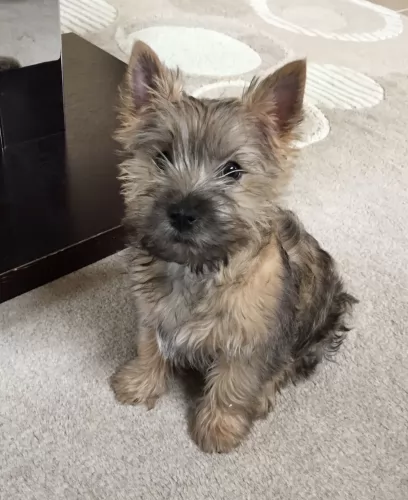 The small sturdily built working Terrier is intelligent and courageous. Bright-eyed, he is small and active and he just loves to work- and party hard with his human family. You’ll see if you’ve got a ball you want to throw for him, his tail is quivering in anticipation and his ears are erect and alert to any noise. He is smart, independent and courageous.
The small sturdily built working Terrier is intelligent and courageous. Bright-eyed, he is small and active and he just loves to work- and party hard with his human family. You’ll see if you’ve got a ball you want to throw for him, his tail is quivering in anticipation and his ears are erect and alert to any noise. He is smart, independent and courageous.
The Cairn Terrier has a tough, weather-resistant coat that can be any color but not white. He has a waterproof double coat – the outer one being wiry while the undercoat is soft. You’ll find the coat in man colours such as grey, black, red and brindle with dark points on the ears and muzzle.
The interesting thing with a Cairn is that when you get a puppy, you can’t be sure what color he will end up being as it changes over the years. The ears are fox-like, small and erect, and the natural medium-to-short tail is held straight out.
 The Jonangi is a medium sized dog that stands between 43 – 53cm in height and weighs between 12 and 21kg. He is lean and muscular. Because of interbreeding with the Jonangi dog, the colors of their coats can vary and be anything from fawn, white, tan, black, bi-colored or even brindle. The coat is very short and fine which helps it cope with the extreme heat of the environment.
The Jonangi is a medium sized dog that stands between 43 – 53cm in height and weighs between 12 and 21kg. He is lean and muscular. Because of interbreeding with the Jonangi dog, the colors of their coats can vary and be anything from fawn, white, tan, black, bi-colored or even brindle. The coat is very short and fine which helps it cope with the extreme heat of the environment.
The ears are erect, the forehead is often wrinkled and the long tail is held out straight or it hangs down low. The ears are fairly short and are somewhat floppy.
The Jonangi is capable of being a true family pet, becoming loyal and devoted to his human family. This isn't a particularly intelligent dog but they're even tempered, fun loving, social and easy to please.
You'll find them getting on well with other pets in the home and children too. An interesting aspect with this dog is that he seems to like digging a hole and lying in it, even preferring this to the regular dog beds you get.
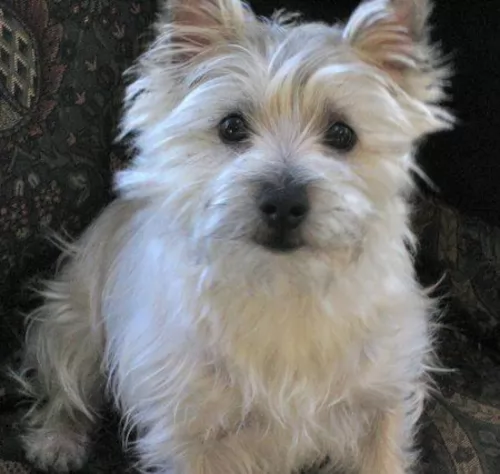 The Cairn Terrier is a fearless, jaunty little dog, known for his courageous spirit and inquisitive nature. He may be small, but he is stubborn. He will respond well to training and socialization which will turn him into the most awesome pet for families. He can make a wonderful friend and playmate for children too. Socialization and training ensures he gets on well with other pets in the household too.
The Cairn Terrier is a fearless, jaunty little dog, known for his courageous spirit and inquisitive nature. He may be small, but he is stubborn. He will respond well to training and socialization which will turn him into the most awesome pet for families. He can make a wonderful friend and playmate for children too. Socialization and training ensures he gets on well with other pets in the household too.
He is small and energetic, and therefore not the kind of dog you can ignore in terms of exercise. He’ll need a good walk every day and he just loves to chase a ball as it takes him back to the days when he was used to chasing- and catching mice.
He isn’t your typical lap-dog at all and with the right care he becomes a devoted, loyal and loving companion.
 Life with a Jonangi is easy going as these aren’t finicky dogs – they’re low maintenance, easy going, fairly healthy dogs that want to please you and just be your pet.
Life with a Jonangi is easy going as these aren’t finicky dogs – they’re low maintenance, easy going, fairly healthy dogs that want to please you and just be your pet.
They make excellent companions, being loving and loyal to their human families and getting on well with other dogs and children in the home.
There are those who are trying to revive the breed, and that is a good thing as these are good natured family pets that will be a positive addition to any home.
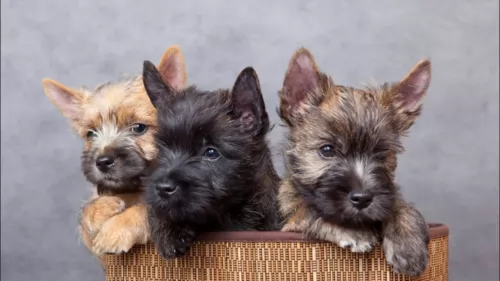 The Cairn Terrier is a robust little dog, and with good care can reach 14 years of age and even older. However, with every dog breed there are some health concerns particular to that breed. With your Cairn Terrier look out for a disease known as Globoid cell leukodystrophy (GCL).
The Cairn Terrier is a robust little dog, and with good care can reach 14 years of age and even older. However, with every dog breed there are some health concerns particular to that breed. With your Cairn Terrier look out for a disease known as Globoid cell leukodystrophy (GCL).
Known also as Krabbe Disease, Globoid cell leukodystrophy (GLD) is a rare but fatal disease. It is caused by a mutation on the dog’s DNA. There is abnormal processing of an enzyme needed for the production of myelin, a substance that protects the nerves in the brain and spinal cord. The dog is weak, it has tremors and isn’t co-ordinated. The Cairn Terrier is a breed of dog more susceptible to GCL.
Your Cairn Terrier may well suffer with joint diseases. These diseases, such as luxating patella which is about loose knee joints, and hip dysplasia which is a degenerative hip disease, can cause plenty of pain and discomfort for your pet.
Glaucoma is an eye disease where there is pressure on the eye, causing inadequate fluid drainage. Without treatment, there can be damage to the optic nerve which can lead to blindness.
 This dog is a robust breed, used to living under difficult circumstances. You won't find many inherited diseases with him, but still it pays to know about some of the more common dog illnesses that he might face.
This dog is a robust breed, used to living under difficult circumstances. You won't find many inherited diseases with him, but still it pays to know about some of the more common dog illnesses that he might face.
With any dog, the joints can take quite a pounding which can lead to injuries. You may notice your dog doing less and having difficulty with common activities. Your dog may even have lameness. Your vet will try to avoid surgery and look at things such as diet and weight management. There are also medications, anti-inflammatories and pain relievers.
Ear infections are common with dogs and can be caused by allergies, ear mites and bacteria in the ear canal. Your Jonangi may be tilting his head or shaking it, he may be constantly scratching his ear, he may even have lack of balance and an unpleasant odor coming from his ear because of a discharge. Take him to the vet as soon as you think he has an ear infection.
This problem which affects a dog’s lower urinary system can be totally debilitating for your dog. There are many problems which can cause this problem in your pet and which can lead to health conditions such as incontinence.
Older dogs and those with diabetes are more prone to urinary tract problems. Your dog will strain or yelp with discomfort when trying to pass urine. The urine may be very cloudy or even have blood in it and there may be dribbling of urine too. Other signs can be vomiting, lethargy, back pain, weight loss and change in appetite. See your veterinarian for immediate medical attention. It is considered a medical emergency.
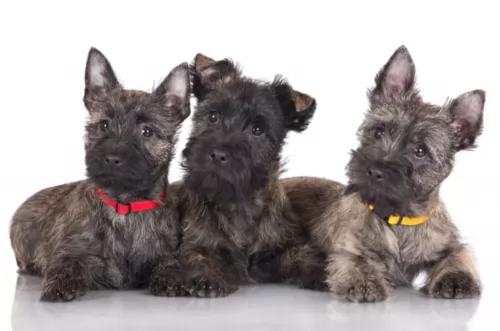 The Cairn Terrier sheds very little and the coat is easy to groom. Give him a thorough brushing twice a week to rid him of loose hairs. Some trimming will be needed as the coat can become shaggy and unruly.
The Cairn Terrier sheds very little and the coat is easy to groom. Give him a thorough brushing twice a week to rid him of loose hairs. Some trimming will be needed as the coat can become shaggy and unruly.
Brush his teeth at least 2 or 3 times a week to prevent tartar build up that can lead to bacteria, gum disease and possible tooth loss.
The Cairn Terrier is small but he is an active dog and therefore needs to be on a high-quality dog food. If you feed him a commercially manufactured food, make sure its appropriate to his age, size and activity levels.
He is a small dog so you want to be careful about not letting him become overweight. Try and alternate his commercially manufactured food with some home-made rice, vegetables and meat and also include some raw meat in from time to time. This is of particular importance as chronic skin allergies are common in all terrier breeds. Make sure that there is always a clean bowl of fresh water available to him day and night.
 With commercially manufactured dog food, there are companies that make quality foods that are formulated for certain conditions such as joint health. They have additives in them such as fish oils which decrease inflammation. Always look for a food that is appropriate for your dog’s age and energy levels.
With commercially manufactured dog food, there are companies that make quality foods that are formulated for certain conditions such as joint health. They have additives in them such as fish oils which decrease inflammation. Always look for a food that is appropriate for your dog’s age and energy levels.
Add in your own home-made food to his dry kibble such as cooked chicken, brown rice and pasta as well as vegetables and also try to include some raw meat into his kibble from time to time. Fresh, cool water should be available to him night and day.
With his short coat, the dog is looked upon as low maintenance. Brush him a couple of times a week to make sure the coat remains shiny. Check his eyes, ears and teeth for infections.
This dog is lean, energetic and agile. With his long strides, he likes to run over terrain sniffing and following scents. He is more suited to life in the countryside than to the city. Make sure you have a reasonable sized garden for him and meet his exercise needs by taking him on walks and playing ball and fetch games with him.